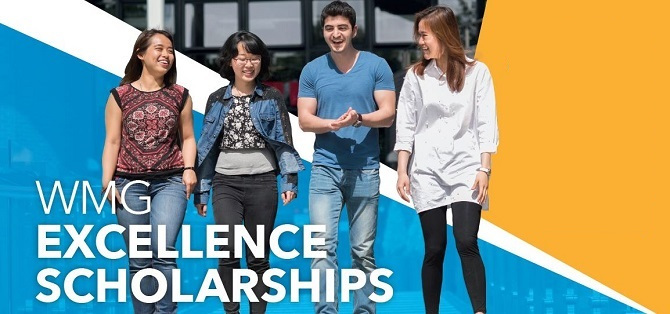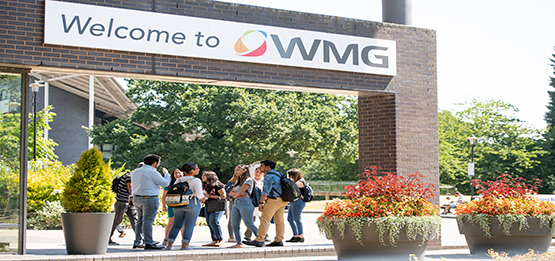Cyber Security Engineering (MSc) (2023 Entry)

Explore our Cyber Security Engineering taught Master's degree.
Cyber Security Management is designed for Computer Science, Engineering or other STEM graduates looking to take a leading role in securing the digital assets upon which an organisation or system is critically dependent.
With our expert guidance, you will learn to understand the cyber threat landscape, manage resources, implement solutions and effectively communicate these to senior decision makers. This course is certified by the National Cyber Security Centre (part of GCHQ).
Course overview
Cyber security is not simply about protecting the internet. As our world becomes ever more dependent upon digital systems, our vehicles, infrastructure, industrial controls, finances, and medical devices all exist within the cyber domain, and all need securing.
By studying Cyber Security Engineering at Warwick, you will deepen your knowledge of this multifaceted cyberspace. You will understand the nature of this evolving cyber environment, and how to protect and enhance the human experience within it.
This MSc focuses on the technical aspects of cyber security and how these may be implemented in a multi-disciplinary way. The practical applications of topics are emphasised, as well as developing your abstract analytical skills. You will also gain unparalleled exposure to industry.
This course is certified by the National Cyber Security Centre (part of GCHQ).
Warwick is an Academic Partner of CIISec and the MSc in Cyber Security Engineering is affiliated to CIISec.
General entry requirements
Minimum requirements
2:1 undergraduate degree (or equivalent) in IT, Computer Science, or a related subject.
Candidates with a UK 2:2 (or equivalent) may be accepted upon demonstration of relevant professional experience.
English language requirements
You can find out more about our English language requirementsLink opens in a new window. This course requires the following:
- Band A
- IELTS overall score of 6.5, minimum component scores not below 6.0
International qualifications
We welcome applications from students with other internationally recognised qualifications.
For more information, please visit the international entry requirements pageLink opens in a new window.
Additional requirements
Candidates with professional experience should include their CV with their application.
Core modules
Core modules are required modules that all students will complete whilst on this programme. For Cyber Security Engineering (CSE), your core modules are:
- Cyber Security Research Methods
- Managing Cyber Risk Audit and Compliance
- Network Security
- Applied Cryptography
- Digital Forensic Investigation
- Ethical Hacking
- Proactive Cyber Defence
Optional modules
Alongside your core modules you should select an additional elective module. Options will be made available at the beginning of the academic year and will include modules such as:
- Enterprise Cyber Security
- Cyber-Physical Systems
- Cloud Security
- Cyber Incident Management
- Data Science and Machine Learning
Read the module descriptions for this course on WMG’s website.Link opens in a new window
Teaching
This course has two components – a taught component accounting for two thirds of your time and effort, and a research component accounting for one-third.
For the taught component, we blend synchronous and asynchronous learning delivered through lectures, seminars, lab work, syndicate exercises, simulations, and case studies. The majority of modules are taught in small classes to facilitate and encourage interaction. Others practice larger-scale lectures, which are then supported by small class seminar and group activities. Our module leaders have extensive industry experience. Guest speakers from industry also contribute regularly, bringing real-world insight into your learning experience.
In addition to your taught modules, you will undertake a major project as part of your Masters’ degree, which will develop your research and analytical skills and enable you to specialise. This is nominally 600 hours (60 CATS points) of learning, mainly taking place during the Spring and Summer terms. You will engage regularly with your Project Supervisor and to provide progress updates and drafts of your work to an agreed schedule.
As a CSE student, your project will need to demonstrate technical depth and will ideally involve coding and/or practical experimentation.
Class sizes
Overall this course can accommodate up to 60 students, divided into two classes of 30 students for most modules.
Typical contact hours
Module delivery patterns vary, but most will be delivered in a short learning block of up to 4 weeks, allowing your focus to be on one module at a time. Each module nominally accounts for 150 hours, which includes scheduled classroom time and online sessions as well as your independent study and assessments.
Assessment
Modules are predominantly assessed by way of written Post Module Assignments (PMA), but assessment can also be in other formats. Most modules will also have a degree of In-Module Assessment (IMA), which will vary by module and may take the form of presentations, on-line tests, self-reflection or a range of other methods.
For the research component, you will undertake a major project. Project submission is likely to include both a written and a presentation element, and accounts for 33% of your overall academic grade.
Your timetable
Core modules will be allocated to students at the end of the first week of term - you will then be able to view your individual module schedule for the rest of the year via the WMG module selection system.
Elective modules will be bookable through the same system later in the term.
Modules will include scheduled classroom time and online sessions as well as your independent study and assessments, and will usually be delivered within a 4 week timeframe. Occasional classes and study skills sessions may be held at weekends or in the evenings.
As a Masters student, you are expected to manage your own time appropriately. On average, you are expected to commit 38-40 hours of study each week, in order to successfully achieve your Master’s degree.
This is a full-time postgraduate course - undergraduate term dates do not apply. Whilst there are no holidays as such, there will be no teaching scheduled when the University is officially closed, during the two weeks over Christmas and New Year.
Your career
Graduates from Cyber Security in WMG have gone on to work for a variety of employers including:
- Accenture
- PWC
- KPMG
- Deloitte
- IBM
- Ministry of Defence
- HP
- Cisco
- Tata Consulting Services
They have pursued roles such as:
- Cyber Security Consultant
- Information Security Analyst
- Technology Analyst
- IT Security and Governance Officer
- Security Project Manager
- Network Consulting Engineer
- IT Risk and Resilience Manager
- Senior Investigation Officer
Helping you find the right career
Our department has a dedicated professionally qualified Senior Careers Consultant offering impartial advice and guidance together with workshops and events throughout the year. Previous examples of workshops and events include:
- Warwick careers fairs throughout the year
- WMG Future Fest
- Options in Engineering sector event
- Careers for experienced hires
- Careers in Cyber Security
- Careers in healthcare
- Careers in project management
WMG at Warwick
Having forged strong links with global companies through 42 years of collaborative research and development, we really understand the global market you’ll be operating in, and have designed our programmes to match.
Find out more about us on our websiteLink opens in a new window
Our courses
- Cyber Security Engineering (MSc)
- Cyber Security Management (MSc)
- e-Business Management (MSc)
- Engineering Business Leadership (MSc)
- Engineering Business Management (MSc)
- Games Engineering (MSc)
- Healthcare Operational Management (MSc)
- Innovation and Entrepreneurship (MSc)
- Intelligent Manufacturing Systems (MSc)
- International Trade, Strategy and Operations (MSc)
- Programme and Project Management (MSc)
- Smart, Connected and Autonomous Vehicles (MSc)
- Supply Chain and Logistics Management (MSc)
- Supply Chain Leadership (MSc)
- Sustainable Automotive Electrification (MSc)
Our Postgraduate Research degrees
Visiting WMG
There are a number of different ways to visit the University of Warwick throughout the year. We host bespoke PG visits, where you can talk directly with your chosen department and explore our campus through a personalised tour. WMG also organises events for prospective students including a weekly Live Chat so you can connect directly with the department to speak with staff and students from WMG. For more about university wide open days and tours, visit our Postgraduate Visits page.
Scholarships and bursaries

Scholarships and financial support
Find out about the different funding routes available, including; postgraduate loans, scholarships, fee awards and academic department bursaries.

WMG funding opportunities
WMG will be awarding over £1million in scholarships and bursaries to students commencing study on our full-time MSc programmes

Living costs
Find out more about the cost of living as a postgraduate student at University of Warwick.
Additional funding information
We have a number of research projects available which are fully or partially funded. The majority of these are for UK/EU applicants, though occasionally we advertise positions that are also open to overseas applicants. Please refer to specific project descriptions for details. See our Research Degree opportunities here.

Find out how to apply to us, ask your questions, and find out more.

Taught course applications
Here is our checklist on how to apply for taught postgraduate courses at Warwick.

Application advice from WMG
Please see the WMG department web pages for specific application advice and information.

After you’ve applied
Find out how we process your application.

Applicant Portal
Track your application and update your details.

Admissions statement
See Warwick’s postgraduate admissions policy.

Join a live chat
Ask questions and engage with Warwick.
Postgraduate Open Day
Our Postgraduate Virtual Open Day will help you find out more about your course of interest, as well as general topics like applying to Warwick, accommodation, careers and funding.Postgraduate fairs
Throughout the year we attend exhibitions and fairs online and in the UK. These events give you the chance to learn about our Master's and PhD study routes, and the wider context of postgraduate study.
Live chats
Every week, you can connect directly with representatives from Warwick, who will be answering your questions on applying to and studying postgraduate studies at Warwick.
Departmental events
Some academic departments hold events for specific postgraduate programmes, these are fantastic opportunities to learn more about Warwick and your chosen department and course.
Connect with us
Want to hear more about postgraduate study at Warwick? Register your interest and find out more.
